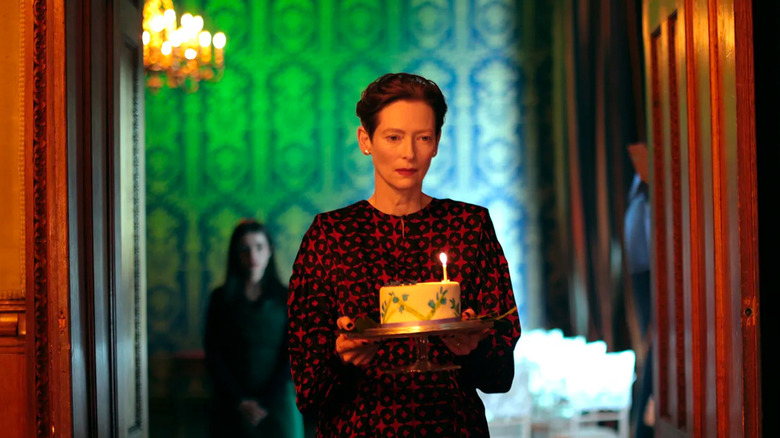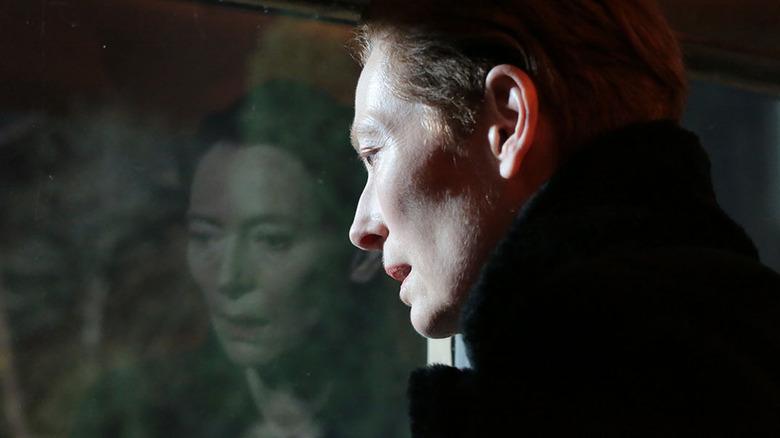The Eternal Daughter Review: Tilda Swinton Haunts Herself In Joanna Hogg's Eerie Drama [TIFF]
Joanna Hogg concludes the story she began with "The Souvenir," and continued in "The Souvenir Part II", with the spooky "The Eternal Daughter." To be clear: this isn't quite a sequel to those films. But at the same time, it is. "The Souvenir" films were autobiographical works in which Honor Swinton Byrne, daughter of Tilda Swinton, played Julie, a fictionalized version of Hogg, while Swinton played Rosalind, a version of Hogg's mother. Now, with "The Eternal Daughter," Swinton is back and pulling double duty — she's playing both Julie and Rosalind this time ("The Souvenir" films were set in the 1980s, while "The Eternal Daughter" is set in the present, which explains while the Julie character is older now).
Once again, Hogg is getting personal. Instead of making a movie about herself, here, she's making a movie about her mother. Sort of. More accurately, she's interrogating herself and asking the question: does she even have the right to make a movie about her mother? Making the whole thing extra personal is the fact that Hogg's real mother died while she was making this film, lending an extra air of melancholy to the proceedings.
Set in a foggy, eerie countryside, "The Eternal Daughter" finds Julie and her mother checking into an inn that Rosalind used to be owned as a home by one of Rosalind's relatives. She has fond memories of spending time here as a child — but he has bad memories, too. And that's nothing unique. The rooms and places we associate with happy recollections can also be sites of regrets. Memories are like ghosts, and they can haunt us.
Spooky, gothic atmosphere
Bathed in the perfect amount of spooky, gothic atmosphere, "The Eternal Daughter" burns down like a candle. It creeps along, drawing us into its dreamy story, keeping us wondering where this is all going. The inn that Julie and Rosalind are staying at is suitably strange — there seem to be no other guests; weird noises sound in the night; tendrils of mist creep out of the surrounding woods and swirl about a nearby graveyard; at a constant, howling wind continually rattles the walls. Cinematographer Ed Rutherford's lighting cuts across darkened halls with pale green glows and lumpy shadows. It's the type of haunting setting that would make Wilkie Collins proud.
Swinton, pulling double duty as mother and daughter, subtly differentiates the characters while also keeping them similar enough to seem related. Hogg deliberately never shows the two Swintons in the same frame, even when the characters are conversing. Also along for the trip is Louie, Rosalind's very good dog (played by Swinton's real dog), who keeps whining as if he senses something others can not.
Like Hogg, Julie is a filmmaker. And like Hogg, she wants to make a movie about her mother — while asking herself if she's even entitled to do such a thing. Who owns our stories? Who has the right to tell, and retell them? And which parts of our stories get told? Which get left in the darkness, untouched, intentionally forgotten — until they come flooding back, haunting us like specters.
With its deliberate (or sloowwwwwww, as some might call it) pacing and inherent lack of action, "The Eternal Daughter" might frustrate some looking for a more traditional ghost story. But "The Eternal Daughter" is plenty haunting. The ghosts here aren't the traditional specters returned from the grave. They're the type of ghosts that haunt us all — memories, both good and bad. We're all haunted by what we remember — and by what we forget. What's haunting you?
/Film Rating: 7 out of 10

